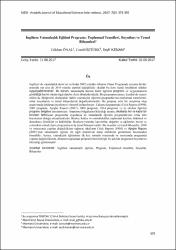| dc.contributor.author | Önal, Gökhan | |
| dc.contributor.author | Öztürk, Cemil | |
| dc.contributor.author | Kenan, Seyfi | |
| dc.date.accessioned | 2020-07-20T07:01:48Z | |
| dc.date.available | 2020-07-20T07:01:48Z | |
| dc.date.issued | 2017 | en_US |
| dc.identifier.citation | Önal, G, Öztürk, C, Kenan, S. (2017). İngiltere vatandaşlık eğitimi programı: toplumsal temelleri, boyutları ve temel bileşenleri. Anadolu Journal of Educational Sciences International (AJESI), 7 (2), 373-395. | en_US |
| dc.identifier.issn | 2146-4014 | |
| dc.identifier.uri | https://hdl.handle.net/11421/24247 | |
| dc.description.abstract | İngiltere’de vatandaşlık dersi her ne kadar 2002 yılından itibaren Ulusal Programda zorunlu dersler
arasında yer alsa da 2010 yılında yapılan değişiklikle okullar bu dersi kendi istedikleri şekilde
uygulayabilmektedir. Bu durum, vatandaşlık dersini farklı öğretim programı ve uygulamaların
görüldüğü her bir okula özgü olan bir derse dönüştürmüştür. Bu çalışmanın amacı, Londra’da ziyaret
edilen üç ilköğretim okulundaki farklı vatandaşlık öğretim programlarının toplumsal temellerini,
ortak boyutlarını ve temel bileşenlerini değerlendirmektir. Bu çalışma, nitel bir araştırma olup
araştırmada doküman incelemesi yöntemi kullanılmıştır. Çalışma kapsamında; Crick Raporu (1998),
2002 programı, Ajegbo Raporu (2007), 2008 programı, 2014 programı ve üç okulun öğretim
programı belgeleri incelenmiştir. Araştırma bulgularına bakıldığı zaman, okullarda her ne kadar bir
birinden farklılaşan programlar uygulansa da vatandaşlık öğretim programlarının ortak dört
boyutunun olduğu anlaşılmaktadır. Bunlar; haklar ve sorumluluklar, toplumsal katılım, hükümet ve
demokrasi, kimlikler ve farklılıklar. Bunların yanında; kavramlar, değerler ve eğilimler, beceri ve
yetenekler olmak üzere programların üç temel bileşeni vardır. Bu boyutlar ve temel bileşenler, 2010
ve sonrasında yapılan değişikliklere rağmen, okulların Crick Raporu (1998) ve Ajegbo Raporu
(2007)’nun vatandaşlık eğitimi ile ilgili önerilerini takip ettiklerini göstermesi bakımından
önemlidir. Ayrıca, vatandaşlık eğitiminin ilk kez zorunlu olmasında ve sonrasında programda
yapılan değişikliklerde, dönemin toplumsal gelişmelerinin belirgin bir şekilde programın boyutlarını
etkilediği görülmüştür. | en_US |
| dc.description.abstract | Although citizenship education in England has been a statutory subject in the National Curriculum
since 2002, schools have had independence in setting their own teaching programmes for the subject
since a revision made in 2010. This led to different programmes being applied in almost every school
and Citizenship became a school-specific subject. The purpose of this study is to discuss the social
foundations, common strands and essential elements of the different citizenship education
programmes in three secondary schools visited in London. Document analyses method was used in
this qualitative research. The main documents reviewed for this study include the Crick Report
(1998), the Ajegbo Report (2007), and the 2002, 2008 and 2013 Citizenship programmes.
Citizenship programmes at three different public secondary schools in London were also reviewed.
It is significant that there were still four common strands of the programmes in the schools visited
even though each school can independently set their own programmes. These common strands were:
rights and responsibilities, social participation, government and democracy, identities and
differences. Additionally, these schools also had three common essential elements in the
programmes: concepts, values and dispositions, skills and aptitudes. In spite of the revision made in
2010, schools are still following the recommendations of the Crick (1998) and Ajegbo Report (2007)
on citizenship education. It is also noteworthy that the process of seeking a solution to certain social
problems was the key for the introduction of citizenship education and revisions of the programmes
in the years following 2002. | en_US |
| dc.language.iso | tur | en_US |
| dc.publisher | Anadolu Üniversitesi | en_US |
| dc.rights | info:eu-repo/semantics/openAccess | en_US |
| dc.subject | İngiltere Vatandaşlık Eğitimi | en_US |
| dc.subject | Program | en_US |
| dc.subject | Toplumsal Temeller | en_US |
| dc.subject | Boyutlar | en_US |
| dc.subject | Bileşenler | en_US |
| dc.subject | England’s Citizenship Education | en_US |
| dc.subject | Programme | en_US |
| dc.subject | Social Foundations | en_US |
| dc.subject | Strands | en_US |
| dc.subject | Elements | en_US |
| dc.title | İngiltere vatandaşlık eğitimi programı: toplumsal temelleri, boyutları ve temel bileşenleri | en_US |
| dc.title.alternative | National curriculum for citizenship in England: social foundations, strands and essential elements | en_US |
| dc.type | article | en_US |
| dc.relation.journal | Anadolu Journal of Educational Sciences International (AJESI) | en_US |
| dc.contributor.department | Anadolu Üniversitesi | en_US |
| dc.identifier.volume | 7 | en_US |
| dc.identifier.issue | 2 | en_US |
| dc.identifier.startpage | 373 | en_US |
| dc.identifier.endpage | 395 | en_US |
| dc.relation.publicationcategory | Makale - Ulusal Hakemli Dergi - Başka Kurum Yazarı | en_US |


















